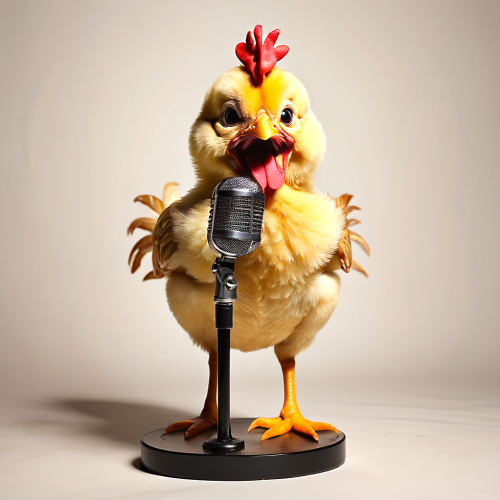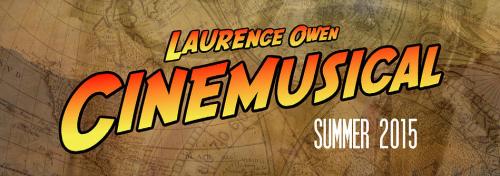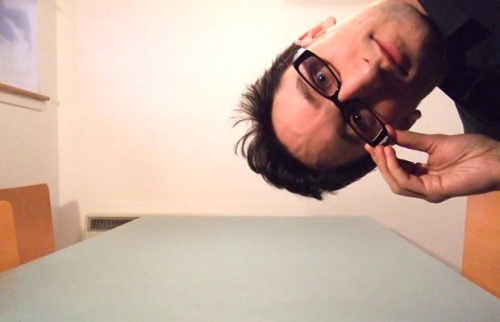
Robert Wringham is what Americans would call a hyphenate. He does all sorts of things. Basically he is a writer of humorous books; plus he has written two histories of alternative comedy; and he is editor of the New Escapologist magazine which “takes the stance that work has too central a position in Western life”.
He has appeared in previous blogs here and is currently co-producing Melt It! a documentary film about The Iceman.
We were supposed to be having a chat about Robert’s live performance at the Glasgow Comedy Festival this week. But I am not one to keep to the subject…
JOHN: The Iceman has transitioned from a performance artist with added humour to a ‘proper’ painting-type artist… He’s sort of an outsider.
ROBERT: Yes. But he refuses to see himself as an outside artist. He was just given the chance to show his art in Paris under the premise that he is one of several ‘outsider’ artists. But he wasn’t happy with that, because he sees himself as an ‘insider’ artist.
JOHN: Define an outsider artist?
ROBERT: People who are not professional artists. They’re usually mentally ill or children or animals.
JOHN: I think he qualifies on all three. Do you think you are an outsider writer?
ROBERT: No… Well, yes.
JOHN: You’re a mad, childlike animal?
ROBERT: The thing I aspire to is… well, I always look to Simon Munnery. To many comedy fans, he’s the finest comedian there is, but he is not a household name and I think that’s the way to be. To try and create something integral, something different. He used to have a mantra: We aim to fascinate, not entertain.
That’s what I like: Simon Munnery, Chris Lynam, The Iceman. People like that.
JOHN: You said ‘integral’ there. What does that mean in this context?
ROBERT: They haven’t ‘sold out’, they haven’t been chasing the Eddie Izzard market.
JOHN: You mean they’re not recognised by the average punter standing in a bus queue?
ROBERT: They have their own standards and been successful in what they want to do.
JOHN: They’ve become admirable cult successes. So what’s this show of yours: The Annotated Audiobook?
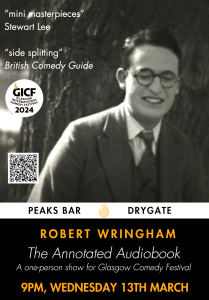
Annotated Audiobook annotated…
ROBERT: I’m doing a live show for the first time in fifteen years.
JOHN: It’s part of the Glasgow Comedy Festival and you’re performing in the Peaks Bar of the Drygate Brewery.
ROBERT: Yes, it’s literally a piss-up in a brewery So what could possibly go wrong?
JOHN: It’s happening this Wednesday – which is the 13th.
ROBERT: Like I said, what could possibly go wrong?
JOHN: Why did you stop doing live shows fifteen years ago?
ROBERT: Because really what I like to do is write. I got my start in stand-up comedy but I never considered myself a stand-up. I was basically just dabbling in something I was a fan of. I always loved stand-up comedy of the 1980s and speciality acts.
It was my start, but then I realised: Yes, I want to write funny stuff, but I don’t want the comedian’s lifestyle – I don’t want too be touring and fretting about performance all the time; I want to be writing short pieces and that’s what I’ve been doing all this time. But your real question is Why now?
JOHN: Is it? Oh… Why now?
ROBERT: Good question. People are nostalgic about the pandemic now because they’ve all had to go back to work. But, for me, the pandemic was utterly depressing – stuck in my flat, alone, without much to do. So, when we came out of the pandemic, what I wanted to do was live, real entertainment again. Collaboration with people. Going out. Engaging with real life again. Not just the internet.
I thought: How can I turn my comedy writing into performance again? And I think I’ve found a way.
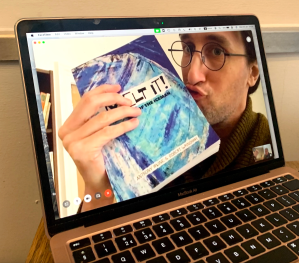
The Iceman book, currently being shot as a documentary
So I’m working with other people. There’s the Iceman film Melt It!, of course, with Anthony Irvine and Mark Cartwright – YouTuber GingerBeardMark. And I have a novel in progress with an American artist called Landis Blair.
JOHN: An artist? So he’s illustrating it?
ROBERT: He is writing long-form for the first time. It’s a comedy fantasy. There will be illustrations, but it won’t be a comic book. It’s a novel.
JOHN: Lke Charles Dickens’ novels, which had illustrations?
ROBERT: Yes. If you think of those Sherlock Holmes novels where there’s occasionally an illustration.
All these works are not just me on my own; they involve other people.
JOHN: So you’re basically just being lazy and letting other people do the work?
ROBERT: (LAUGHS) I wouldn’t go that far.
I want to get my works out and actually read them in public. I’ve always wanted a theatrical premise to go with the reading. Whenever you go and see someone doing a reading, it’s fine if you know what you’ve signed up for. But, in a comedy environment, you kinda want something a bit extra. You want a premise.
So my premise is it’s an audio book recording for which I want a live audience; so the audience are coming to play a part in that. A little bit of participation from the audience and, if nothing else, I’ll capture their noises.
That’s the premise of The Annotated Audiobook and I’ll be riffing around the material. It won’t just be me reading it verbatim from the page, I’m going to be telling the story behind the story, commentating on what happens in the room and things like that.
So what do you think, John. Is it a clever idea or is it all doomed to failure?
JOHN: Everything’s doomed to failure. We’re all going to die. Eventually, the sun explodes and destroys everything.
ROBERT: I was thinking a little more short-term than that.
JOHN: It’s a one-off, isn’t it? You can’t say every time you perform that it’s for an audio recording.
ROBERT: Originally, I had no interest in actually recording it. It was just a theatrical premise. But I think next year you could see a Robert Wringham audio book come out of it.
JOHN: Will that sell as well as a printed book?
ROBERT: What I hear is a lot of people don’t read ‘old-fashioned’ books; they only want audio now.
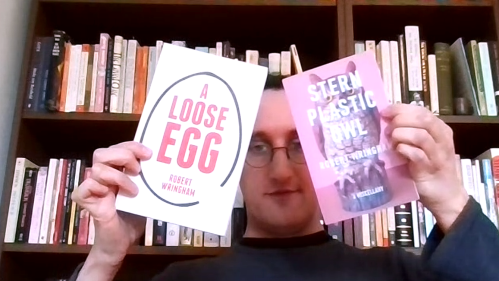
Robert Wringham with two of his own many ‘old-fashioned’ print books
JOHN: So have you a grand tour planned?
ROBERT: No. The Glasgow show will either be the beginning of something or the end of something. Kind of a pilot. If it goes well, I’d like to do more shows like The Annotated Audiobook. I’d like to do them occasionally.
I want to bring my books to the stage and I think I’ve found a cheeky, crafty way to present that.
JOHN: …and you’ll make loads of money out of all this, like Simon Munnery and The Iceman…?
ROBERT: Of course not. No. Simon Munnery recently worked as a cleaner in a chicken processing plant.
JOHN: Is this common knowledge? Can I print that?
ROBERT: Well, he talks about it in his act. It’s all real stuff. He brought some innovation to the job. He made some sort of extended vacuum cleaner that could get into places the regular vacuum couldn’t get.
JOHN: I’ll tell you where the money is: chicken sexing. I once met a man who travelled the world chicken sexing. He was making an absolute fortune because it’s really commercially important to know whether these tiny chicks with tiny genitals are male or female.
ROBERT: You’ve told me that before.
JOHN: I am a man of few anecdotes.
ROBERT: It’s very strange, because The Iceman once worked in a chicken factory as well. It seems like that’s the social safety net for comedians who don’t make fortunes.
JOHN: There was Chic Murray… but what did The Iceman do in the chicken factory?
ROBERT: He was a security guard.
JOHN: To stop chickens escaping or cats invading?
ROBERT: He says they were worried about Animal Rights protestors getting in. But he says, as a vegetarian, that if they had broken in he would have just let them carry on.
JOHN: I may have gone off-subject.
ROBERT: Yes… The Annotated Audiobook at the Glasgow Comedy Festival this week…
JOHN: Oh yes.
The future of comedy…
